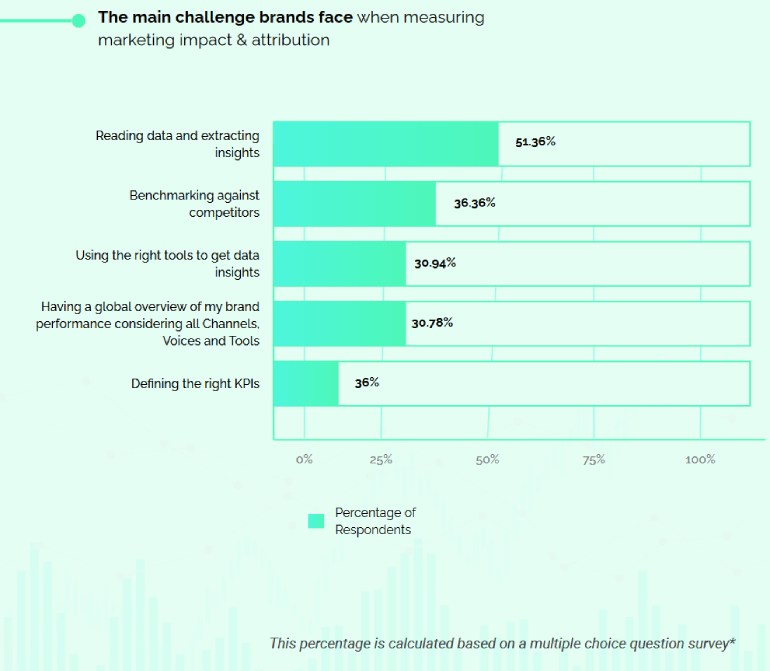 Understanding brand performance relies on considering all strategic channels and voices used in campaigns across different markets: examining from a cross-voice, cross-channel, and cross-activation approach will allow for a better understanding of what is working and identify what opportunities brands are missing out on.
Understanding brand performance relies on considering all strategic channels and voices used in campaigns across different markets: examining from a cross-voice, cross-channel, and cross-activation approach will allow for a better understanding of what is working and identify what opportunities brands are missing out on.
The content performance, the creation of impactful experiences and the competitive benchmarking are the three KPIs marketers need to consider. Especially in the fashion and luxury industries, where the brand is the most valuable financial asset, there is a lack of consistent metrics to measure the effectiveness of their data strategies, but the State of Measurement in Fashion, Luxury & Beauty 2022 from Launchmetrics and Publicis Sapients comes to their rescue.
“Adding more touch points between a customer and a website, app, platform, or mobile payment system has increased the amount of valuable data available – if analyzed properly. With the primary goal of leveraging big data to improve performance, brands have made significant investments in digital tools to improve data insights and extract more accurate conclusions. Of more than 94% of brands focused on data analysis, 52% encounter challenges when trying to draw actionable insights. Moreover, the remaining 48% are still trying to find the right tools to get data insights. Therefore, it’s no longer a question of “if” brands should be analyzing data, but how.”
The report is describing the dilemma of modern marketers in the introduction. “The solution relies on the hand of controlling and understanding the brand’s data through tools that are easily accessible to gain insights into their audience,” the report concludes. That helps marketing decision makers better understand marketing’s impact and attribution, by identifying the metrics, tools and KPIs that brands should use to measure the effectiveness of their data strategies.
The report sheds light on marketers' challenges and creates an understanding of the importance of big data and precise measuring points to enable decision-makers to see how they can improve their ROI, increase their brand performance, and achieve greater efficiency.
The key findings of the report include:
1. Marketing data as a key factor for success
- 60% of marketers and 70% of data scientists agree that a unified view of marketing performance must be a top priority for companies.
- More than 50% of CMOs said that data accessibility and clear C-suite visibility of marketing performance are drivers of marketing success. Therefore, creating a clear governance model and system for tracking, reporting, and exploiting marketing data is essential.
- Almost one third of CMOs in the US are investing in measurement and analytics to understand their marketing efforts and enable advanced strategies like personalization at scale.
2. Challenges in measuring marketing impact and attribution
- Around 50% of respondents believe it is difficult to extract actionable insights from data to analyze the success of online activities and decide where to invest.
- 40% of respondents named benchmarking as their biggest challenge and around 30% said identifying the right competitor analysis tool is a key marketing planning obstacle.
- Nearly 50% of CMOs said finding talent with technical skills to interpret marketing data is critical, further compounding CMOs' and CDOs' trust issues in their marketing data.

3. Influencers - from measuring brand awareness to measuring sales impact
- According to the survey, the best voice for brands to increase brand awareness is owned media (39%), followed by influencers (22%).
- Instagram remains the leading marketing channel for luxury businesses, but most respondents said they are limited by current tools and finding the right KPIs to measure ROI is difficult.
- It's no longer enough to think of social media as just a channel to increase brand awareness and engagement. To remain competitive, brands need to understand the impact of their social media strategy on business goals and conversion. The data supports this shift in focus: 80% of marketers use economic metrics to measure influencer effectiveness or try to identify proxies, such as, e.g., website traffic with referral links to try to attribute sales to campaigns. Only 24% prioritize reach and views.
- The benefits of influencers are still undisputed; however, 40% of marketers worldwide rely on influencers to report their data themselves, as brands may not have the tools to track them – opening the door to potential misrepresentations. Thirty-four percent of CMOs and 51% of CTOs believe marketing data is unreliable because reliance on partner self-reporting offers opportunities for manipulation.
4. Linking online and offline
- The study found that collecting customer journey data across different touchpoints is a challenge: only 13% of marketers track stationary traffic in their stores and try to connect it with online activities.
- Nearly 40% of marketers struggle to tie online and offline data together because cross-channel reporting is at least partially, if not entirely, done manually.
5. Personalization - the final frontier in digital marketing
- Brands leveraging real-time personalization for their brand campaigns see an average increase of 15% in sales, as well as a two to three times faster growth rate in revenue compared to competitors.
- Additionally, more than 80% of consumers say they are more likely to purchase when brands personalize the experience.
- Over 50% of consumers say they will cancel contact with a brand when it isn’t personalized.
Personalization allows brands to tailor their messages to consumers and by doing so, to control the touchpoints of the customer's path to purchase. However, according to the report, 40% of respondents rely on either manual collection and collation of data, or manually inputting performance data from a third-party after the activation has finished.
“Executing personalization at scale is important as brands are looking to own their data which will lead to strengthening their brand equity through brand relevance in the market. Personalization can speed up the sale cycle by reducing the touch points on the consumer’s journey, create more returning buyers by building a loyal audience, and increase your ROI. Consequently, marketers need to shift to a model where they own their data and implement an infrastructure to ingest it in real-time because marketers need to own their customer journey and optimize it in real-time”, the report concludes. For more detailed insights, please read the full report.
By Daniela La Marca



